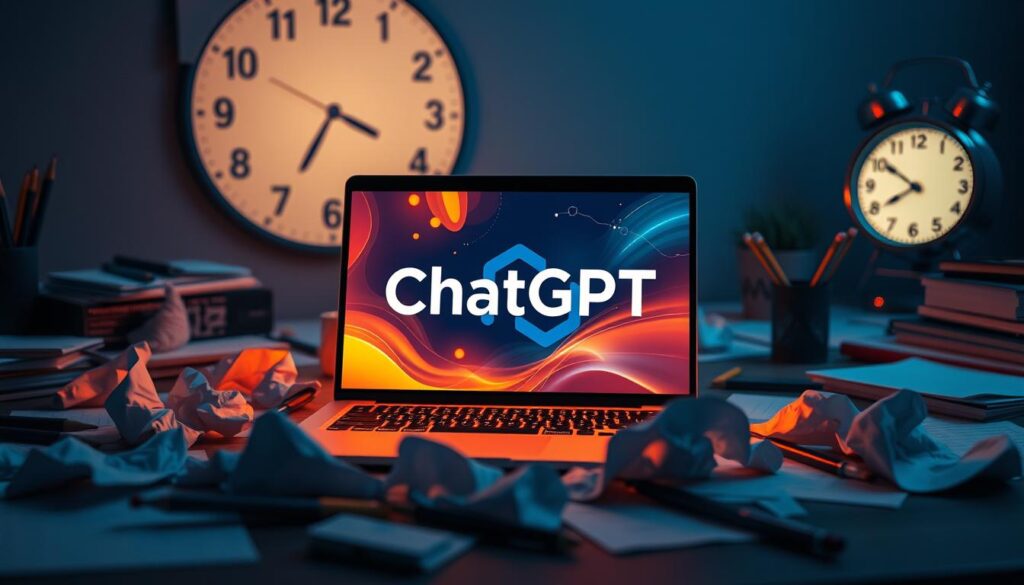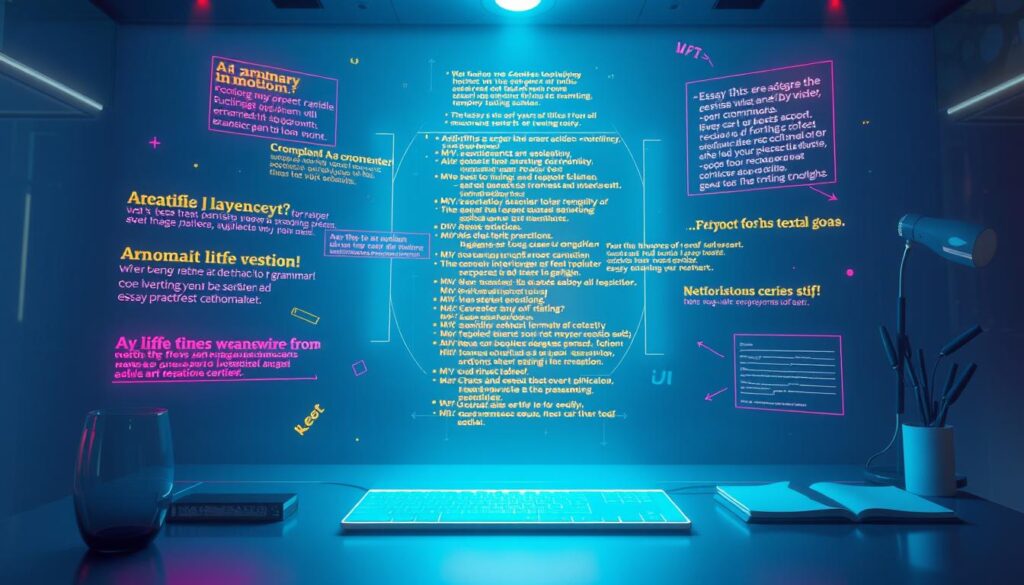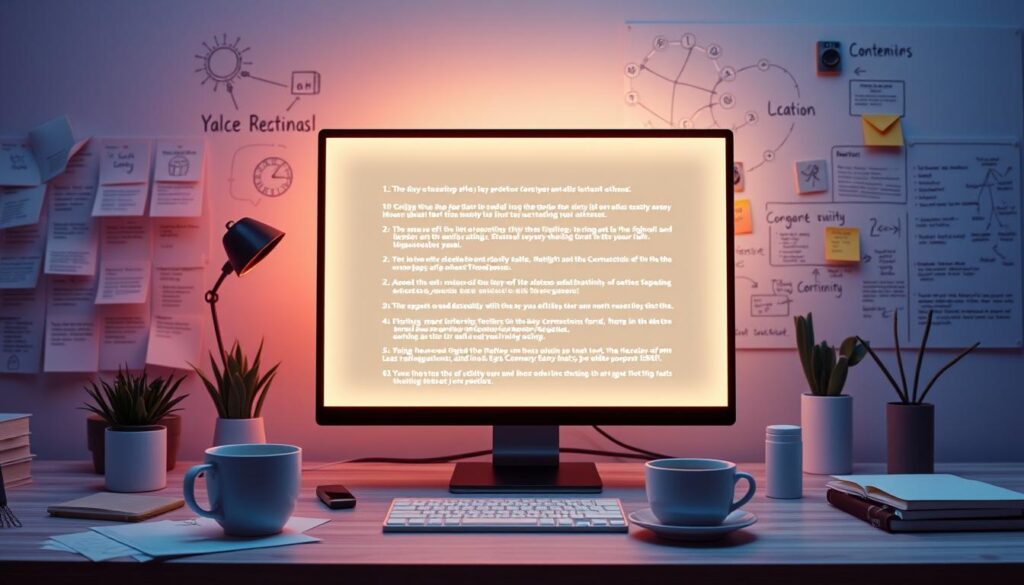“The only way to do great work is to love what you do.” – Steve Jobs. As technology becomes more integral to education, students are turning to AI tools like ChatGPT for writing assistance. The question of whether one can ask ChatGPT to edit an essay is common among those looking to improve their writing. Since its debut in November 2022, ChatGPT has garnered both interest and concern in the educational world. It can generate text that closely resembles human writing, raising questions about academic integrity1.
Despite the challenges, ChatGPT can be a valuable asset when used appropriately. It can help students overcome writer’s block and enhance their productivity. It’s particularly useful for tasks such as brainstorming and proofreading essays12. This article delves into the potential of ChatGPT as an essay editing tool, its advantages, and the hurdles it presents to academic writing.
Key Takeaways
- ChatGPT was launched in November 2022 and has raised concerns in the education sector.
- Proper use of ChatGPT can enhance productivity and alleviate writer’s block.
- Plagiarism detection tools may not recognize ChatGPT-generated text as copied content.
- Students can utilize ChatGPT for brainstorming and proofreading their essays.
- Using AI for essay writing is generally disapproved by professors.
Understanding Essay Editing
Essay editing is a critical phase in academic writing, aimed at refining content for better clarity and coherence. It helps writers produce essays that effectively convey their understanding and arguments. This process is vital for enhancing the overall quality of the written work.
What Is Essay Editing?
Essay editing involves a thorough review and revision of written content. It corrects grammatical errors, improves the structure, and ensures arguments are clear. An effective editing process can greatly enhance the quality of the final document.
Importance of Editing in Academics
The role of editing in academic writing is paramount. Well-edited essays uphold academic integrity and showcase critical thinking and communication skills. Proper editing ensures the final submission accurately reflects the author’s ideas, meeting academic standards3.
Introducing ChatGPT

ChatGPT is a cutting-edge AI model that generates text like a human. It understands the context of your questions, providing relevant and coherent answers. Many ask, What is ChatGPT? and its role in AI writing. It uses vast datasets to recognize language patterns and create content efficiently.
What Is ChatGPT?
ChatGPT marks a major leap in AI technology. It can produce text on any topic in seconds, making it ideal for writing essays or content4. Users can input details like topic, audience, purpose, and length to improve its output4. Its versatility allows it to adapt suggestions based on user needs, including writing styles like academic essays or blog posts5.
How ChatGPT Functions
To fully utilize ChatGPT functions, understanding its capabilities is crucial. It aids in brainstorming, outlining, and refining language. It’s particularly useful in structuring essays, suggesting introductions, thesis statements, and supporting evidence4. Its memory holds about 3,000 words, enabling more personalized interactions5. Specific prompts enhance the quality of feedback, offering actionable insights and potential ratings6. Students using ChatGPT see a significant improvement in their writing efficiency and coherence.
Benefits of Using ChatGPT for Essay Editing
ChatGPT offers numerous advantages for essay editing, significantly enhancing the writing process. Its standout feature is time efficiency. This AI tool provides instant feedback and suggestions, allowing students to refine their essays in seconds7. As deadlines grow tighter, the need for swift revisions is paramount, making ChatGPT indispensable for those under pressure8.
Time Efficiency
ChatGPT streamlines the editing process, freeing writers to concentrate on content quality. It enables students to create essays swiftly, addressing both grammar and style while preserving their voice9.
Accessibility and Convenience
ChatGPT’s accessibility and convenience are noteworthy. It allows users to engage in convenient essay editing at any time, from anywhere with internet7. This flexibility fosters a productive writing environment, ensuring students are always close to help as they work8. The growing use of AI tools underscores the importance of options that support learning and adapt to individual schedules.
Limitations of ChatGPT in Essay Editing

ChatGPT has become a valuable tool for essay editing, but it’s crucial to acknowledge its limitations. A major concern is potential inaccuracy. Its broad but shallow knowledge base can lead to errors, especially in specialized or technical subjects10. The model suggests edits based on patterns, not true understanding, which may miss critical errors.
Potential Inaccuracy
Academic writers must be cautious of AI inaccuracies. ChatGPT’s edits might seem right but could misrepresent the message or overlook crucial details like citations10. It’s essential to verify these changes, especially in scholarly work where accuracy is paramount.
Dependence on Input Quality
The quality of ChatGPT’s output heavily depends on the input quality effects. Clear and specific instructions are key to its performance. For example, papers with poor syntax or unnatural word choice are common among non-native English speakers11. Relying solely on AI without context can lead to more errors. To get the best results, users should clearly state their needs and review suggestions critically, as ChatGPT might overlook important citations or context11.
Without effective communication, users risk misguiding the AI, resulting in less reliable edits.
Understanding these limitations helps writers use ChatGPT more effectively. It’s important to remember the need for thorough review and critical thinking in editing. For complex or specialized subjects, integrating professional editing services is recommended to ensure credibility and accuracy in academic work1011.
How to Ask ChatGPT for Help
Effective communication is key when asking ChatGPT for essay editing help. Crafting structured requests maximizes the AI’s utility. This allows users to get feedback that meets their specific needs.
Structuring Your Request
Begin by clearly stating the areas of your essay needing improvement. This could include grammar, content clarity, or formatting. Structured requests guide ChatGPT to offer focused, relevant insights tailored to your needs.
Providing Context and Details
Along with structured requests, providing context for editing enhances feedback quality. Include details like assignment length, citation styles, and specific guidelines. This information helps ChatGPT deliver more detailed feedback, leading to better editing outcomes.
ChatGPT offers formative feedback to support learners’ growth and development12. It uses specific prompts to ensure writing meets tone, audience, tense, and format requirements12. Editing with ChatGPT typically takes 5 to 30 minutes, with the AI starting work in 2 seconds13.
Types of Edits ChatGPT Can Perform

ChatGPT offers a range of editing services crucial for refining written content. It excels in grammar corrections and stylistic enhancements, benefiting both students and professionals. The AI swiftly spots and fixes common errors like misplaced commas and sentence fragments. This ensures documents are polished and meet high academic standards.
Grammar and Spelling Corrections
ChatGPT’s primary role is to correct grammar, achieving high accuracy. It identifies typos and offers correct spellings, ensuring text is error-free. For example, it can review an essay, pointing out specific grammar issues. This helps users grasp and rectify their mistakes, a critical step in maintaining text credibility.
Stylistic Suggestions
Beyond grammar, ChatGPT provides stylistic edits to enhance writing quality. It suggests better word choices and rephrasing for clarity and flow. These adjustments are essential for achieving the desired tone or style. Effective communication through writing is greatly improved with these refinements, helping to engage readers more deeply. ChatGPT’s text revision capabilities are particularly beneficial for those struggling with clarity in their writing.
Integrating ChatGPT into the editing process significantly boosts both grammar and style. It also serves as a learning tool, enhancing writing skills for all users1431.
Comparing ChatGPT to Human Editors

The editing world is caught in a fascinating debate: ChatGPT vs. human editors. Each has unique strengths, making an editing expertise comparison crucial for determining the best editing methods. Human editors are unmatched in providing nuanced insights and contextual understanding. They grasp subtleties that AI often misses.
ChatGPT excels in offering rapid feedback and consistent accuracy in spotting grammatical errors. However, it falls short in understanding context and cultural sensitivity. These are key in professional editing.
Advantages of Human Expertise
Human editors offer a wealth of experience and understanding. They can spot subtle nuances like style and tone, which greatly affect how a message is received. Their ability to preserve the author’s voice and maintain narrative integrity is unparalleled.
For high-stakes academic submissions, human review is indispensable. AI can’t match the level of scrutiny and customization needed in these reviewing situations1516.
Situations Best Suited for Human Review
Some tasks require the detailed attention of human oversight. For complex topics needing deep understanding, human editors excel where ChatGPT might falter. High-quality results often come from combining human proofreading with AI tools like ChatGPT.
In creative problem-solving tasks, such as marketing, human editors outshine with their critical thinking abilities1516.
Successful Strategies for Using ChatGPT

Using ChatGPT effectively in essay editing can significantly improve a student’s writing. An iterative feedback approach is key. This method allows for multiple rounds of refinement with ChatGPT, leading to more detailed improvements.
Iterative Feedback Approach
Writers can enhance their essays through repeated feedback from ChatGPT. Each interaction offers deeper insights, guiding adjustments. This method not only refines content but also teaches how to revise effectively for future essays.
Combining ChatGPT with Human Insight
Combining AI feedback from ChatGPT with human editing is crucial. Peer or professor feedback adds a critical layer, ensuring the essay is polished and meets academic standards. This blend of AI capabilities and human critique significantly boosts essay quality. For more on essay editing, explore this resource.
Results from Using ChatGPT

ChatGPT’s integration into essay editing has brought about significant advancements for users. Students have reported substantial results of ChatGPT editing, noting improvements in clarity and argument strength. They’ve seen enhancements in grammar, spelling, and writing style, thanks to the AI’s ability to pinpoint errors and offer suggestions for improvement8.
Common Outcomes
For those aiming to enhance their writing, ChatGPT’s benefits are evident. It analyzes structure and coherence, suggesting reorganization to strengthen arguments8. With real-time feedback, writers can save time and elevate their work’s quality, especially when facing deadlines8. This technology highlights areas of excellence and identifies sections needing refinement, leading to constructive feedback.
Case Studies of Successful Edits
Case studies illustrate the practical advantages of ChatGPT. For instance, essays undergo a significant transformation after AI intervention. A student’s initial essay, lacking coherent argumentation and plagued by grammatical errors, was transformed by ChatGPT’s revisions. The result was a clearer, more coherent piece, showcasing the AI’s potential in enhancing writing quality17.
Moreover, sessions like the MBA essay tips session scheduled for December offer further insights. They highlight how AI tools can refine writing and enhance its quality in academic environments. These opportunities underscore the collaborative potential of AI and human creativity in crafting compelling essays178.
Ethical Considerations

The rise of AI tools like ChatGPT has brought ethical concerns to the forefront. It’s crucial to understand plagiarism and the need for transparency in editing. Users must ensure they maintain academic integrity when using these tools to avoid ethical breaches.
Plagiarism Concerns
Plagiarism is seen as unethical, violating intellectual property rights. While it’s not illegal in most U.S. educational settings, many institutions have strict rules against it18. ChatGPT’s ability to generate text similar to existing work raises concerns about originality in academic settings19. Users must be cautious to avoid plagiarism by adding their own original thoughts to AI-generated content.
Transparency in Use
Transparency is key when using ChatGPT for editing. Users should clearly mark their original work and any AI modifications. This approach helps avoid misrepresentation in academic work19. By disclosing AI contributions, users can ensure their work remains authentic and responsible.
Integrating ChatGPT into the Writing Process

Integrating ChatGPT into the writing process can significantly enhance students’ overall performance. Students should consider utilizing ChatGPT at critical stages such as brainstorming, drafting, and revising. This tool excels in generating topic ideas, making it a valuable asset during the initial stages of essay development. For instance, ChatGPT can generate a response for a student prompt, suggesting a topic for an issue analysis report on climate change20. Additionally, it can provide several alternative topics when students seek variety20.
When to Utilize ChatGPT
Students may find it beneficial to engage ChatGPT when they’re looking for inspiration or needing to refine their writing. Implementing ChatGPT for brainstorming helps create an engaging and enjoyable research process. It encourages students to choose topics they are passionate about20. Moreover, this AI tool can level the playing field by enabling novice writers to produce work comparable to more experienced peers. This ultimately boosts their confidence and skill sets21.
Preventing Overreliance
While ChatGPT offers numerous benefits, preventing overuse of AI remains crucial. Students should avoid developing a dependency on its suggestions, as personal growth in writing skills is essential. It is important to experiment with different prompt structures to maximize the efficacy of ChatGPT. This fosters originality and creativity in their work21. By establishing a balance between AI assistance and self-sufficiency, students can enhance their writing performance. They can maintain their unique voice throughout the writing process.
User Experiences with ChatGPT

User experiences with ChatGPT reveal a wide range of opinions on AI editing, especially in essay revisions. Many praise its efficiency and user-friendly interface. They note an improvement in writing quality thanks to ChatGPT’s suggestions. The tool is seen as a game-changer, enhancing essays in structure and clarity, and speeding up editing tasks. The convenience of immediate help in writing is a major plus for many22
Positive Feedback
Many have expressed their satisfaction with ChatGPT’s essay editing capabilities. They appreciate its quick identification of grammatical errors and constructive feedback. The tool’s intuitive design is a key factor in its popularity, making it easier to use than traditional editing methods. This positive feedback highlights the potential for AI to enhance academic performance and the growing acceptance of AI editing technologies23.
Criticisms and Challenges
Despite the overall positive sentiment, there are criticisms of AI tools like ChatGPT. Some users face issues with inaccurate suggestions, leading to misunderstandings. There’s also concern that over-reliance on AI could harm creativity and critical thinking. Users advise a balanced approach, combining AI with traditional editing methods2223..
Future of AI in Education

The evolution of AI tools in academic settings is set to transform education profoundly. Educators embracing these technologies could boost student engagement and learning results. Initially, tools like calculators were met with skepticism, with 72% of teachers opposing their use by seventh graders in the mid-1970s24. However, acceptance grew, with 84% of teachers wanting to use calculators by the late 1970s24. This shift mirrors the broader trend of embracing new tools to revolutionize learning.
Role of AI Tools
AI tools are revolutionizing academic settings, driving the evolution of writing and editing. They enable students to brainstorm, outline essays, and improve language skills25. For educators, these tools streamline preparation and assessment. AI models, like GPT-4, can tutor students effectively when prepared24. AI’s grammar and spelling help enhance language skills, ensuring clarity and fluency, especially for non-native speakers25.
Long-term Impact on Writing and Editing
The long-term effects of AI tools on writing and editing in education will be significant. As AI becomes more integrated, concerns about dependency echo past worries about calculators24. Yet, the benefits are substantial; AI aids in developing critical thinking and communication skills through personalized feedback and creative writing encouragement. This evolution offers students a chance to use technology without losing their unique voice and storytelling in college applications25.
Exploring Alternatives to ChatGPT

ChatGPT provides various features for essay editing, but many alternatives exist for different needs. These options include other AI writing tools and professional editing services. They cater to various writing requirements, guiding users to the most suitable tools.
Other AI Writing Tools
FactGPT by LongShot AI stands out, combining OpenAI’s GPT-3 with Google’s BERT for content generation. It excels in producing current information26. ChatSonic also shines, with enhanced capabilities for real-time news and data26. YouChat, powered by OpenAI’s GPT-3.5, offers chatbot services and search results, broadening its scope26. Jasper Chat, with GPT-4, supports 29 languages, catering to a global audience26. The Canva AI Paragraph Generator is ideal for those in design, creating custom paragraphs with Canva’s tools.
Professional Editing Services
Professional editing services are also favored by many. Human editors offer experience and a deep understanding of language, surpassing AI capabilities27. Tools like Grammarly and ProWritingAid provide detailed analysis and suggestions, enhancing writing quality. They offer personalized feedback, crucial for refining writing skills and ensuring clear communication.
These services are evaluated based on response quality, customization, and user experience. This helps users find the best alternative for their needs28.
Conclusion
ChatGPT’s integration into essay editing offers a compelling argument for improving academic writing. It brings benefits like time savings, easy access, and the ability to enhance grammar and style. Yet, this summary also raises concerns about accuracy and the risks of over-reliance on AI tools. ChatGPT, trained on 45 terabytes of data, shows its strength but also its limitations, which can lead to errors in information3.
Using ChatGPT wisely is key. It can greatly aid in editing, but human insight is crucial for deep understanding and creativity. Schools and universities face challenges like plagiarism and the role of AI in academic integrity. Employing ChatGPT as a supplementary tool, rather than the main solution, helps students improve their writing while keeping their unique voices3.
ChatGPT is a valuable asset in the writing world, used with caution. Recognizing its strengths and weaknesses allows for better essay quality. This ensures that personal creativity remains central to writing endeavors6.
FAQ
Can I ask ChatGPT to edit my essay?
What is the importance of essay editing?
How does ChatGPT function as an editing tool?
What are the benefits of using ChatGPT for essay editing?
Are there limitations to using ChatGPT for essay editing?
How should I structure my request when asking ChatGPT for help?
What types of edits can ChatGPT perform?
How does ChatGPT compare to human editors?
What strategies can enhance the effectiveness of using ChatGPT?
What outcomes can students expect from using ChatGPT?
What ethical concerns should be considered when using ChatGPT?
When is the best time to use ChatGPT in the writing process?
What has been the general user feedback regarding ChatGPT?
What is the future role of AI tools like ChatGPT in education?
Are there alternatives to ChatGPT for essay editing?
Source Links
- How to (correctly!) use ChatGPT for essay writing
- How to Use ChatGPT as an Essay Writer – Unlimited Graphic Design Service
- Should I Use ChatGPT to Write My Essays? – Harvard Summer School
- How to Use ChatGPT to Write an Essay –
- How to… use ChatGPT to boost your writing
- Can I Ask ChatGPT to Edit My Essay? Here’s How! – Word Spinner
- How to Ethically Use ChatGPT in the College Essay Process
- Can I Ask ChatGPT To Edit My Essay?
- Can Chat GPT Edit Essays: Useful AI Revision Tips & ChatGPT Prompts
- What Are the Limitations of ChatGPT? | Oxbridge Essays
- I Cheated: Using ChatGPT in Academic Editing
- ChatGPT is my writing coach and editor: Here’s How
- How to use ChatGPT to edit your writing, step by step (using the 7 copy sweeps)
- Can ChatGPT Proofread Documents?
- Human Proofreading vs. ChatGPT Proofreading
- Human Editors or ChatGPT for Research Publication: A comparison
- Can I Use ChatGPT to Edit My Essays If I Write Them from Scratch?
- The Problem with ChatGPT Writing Your Essay – Seven Pillars Institute
- ChatGPT in College Education: Promises, Limitations, and Ethical Considerations – The K. Patricia Cross Academy
- Using ChatGPT to Get Started with the Writing Process
- How to Use ChatGPT to Improve Writing – Boost Your Writing Skills
- Can I Use ChatGPT to Edit My Essays If I Write Them from Scratch?
- Using chat gpt for essay
- The future of education in a world of AI
- Can You Use AI Tools Like ChatGPT for Your College Essays? – Crimson Education AE
- 11 ChatGPT Alternatives for Writing Innovation
- 8 ChatGPT Alternatives You Can Try In 2024
- 20 Best ChatGPT Alternatives in 2024 | ClickUp







